Related Research Articles

In Greco-Roman mythology, Aeneas was a Trojan hero, the son of the Trojan prince Anchises and the Greek goddess Aphrodite. His father was a first cousin of King Priam of Troy, making Aeneas a second cousin to Priam's children. He is a character in Greek mythology and is mentioned in Homer's Iliad. Aeneas receives full treatment in Roman mythology, most extensively in Virgil's Aeneid, where he is cast as an ancestor of Romulus and Remus. He became the first true hero of Rome. Snorri Sturluson identifies him with the Norse god Vidarr of the Æsir.
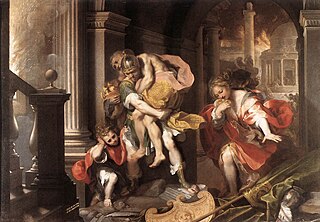
The Aeneid is a Latin epic poem, written by Virgil between 29 and 19 BC, that tells the legendary story of Aeneas, a Trojan who fled the fall of Troy and travelled to Italy, where he became the ancestor of the Romans. It comprises 9,896 lines in dactylic hexameter. The first six of the poem's twelve books tell the story of Aeneas' wanderings from Troy to Italy, and the poem's second half tells of the Trojans' ultimately victorious war upon the Latins, under whose name Aeneas and his Trojan followers are destined to be subsumed.

Dido, also known as Elissa, was the legendary founder and first queen of the Phoenician city-state of Carthage, located in modern Tunisia. Known only through ancient Greek and Roman sources, most of which were written well after Carthage's founding, her historicity remains uncertain. In most accounts, she was the queen of the Phoenician city-state of Tyre who fled tyranny to found her own city in northwest Africa.

Patricia Claire Bloom is an English actress. She is known for leading roles in plays such as A Streetcar Named Desire,A Doll's House, and Long Day's Journey into Night, and has starred in nearly sixty films. She is one of the last surviving stars from the Golden Age of Hollywood.
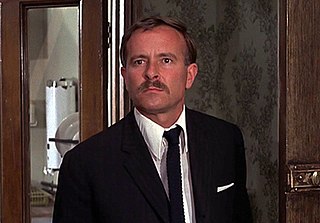
Alexander Duncan McCowen, was an English actor. He was known for his work in numerous film and stage productions.

Roger William Allam is a British actor, who has performed on stage, in film, on television and radio.
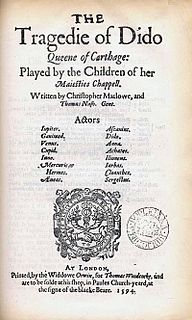
Dido, Queen of Carthage is a short play written by the English playwright Christopher Marlowe, with possible contributions by Thomas Nashe. It was probably written between 1587 and 1593, and was first published in 1594. The story focuses on the classical figure of Dido, the Queen of Carthage. It tells an intense dramatic tale of Dido and her fanatical love for Aeneas, Aeneas' betrayal of her and her eventual suicide on his departure for Italy. The playwrights relied on Books 1, 2, and 4 of Virgil's Aeneid as primary source.

Michael Maloney is an English actor.

There are a wide range of ways in which people have represented the Trojan War in literature and the arts.

Andromaque is a tragedy in five acts by the French playwright Jean Racine written in alexandrine verse. It was first performed on 17 November 1667 before the court of Louis XIV in the Louvre in the private chambers of the Queen, Marie Thérèse, by the royal company of actors, called "les Grands Comédiens", with Thérèse Du Parc in the title role. The company gave the first public performance two days later in the Hôtel de Bourgogne in Paris. Andromaque, the third of Racine's plays, written at the age of 27, established its author's reputation as one of the great playwrights in France.

The Posthomerica is an epic poem in Greek hexameter verse by Quintus of Smyrna. Probably written in the 3rd century AD, it tells the story of the Trojan War, between the death of Hector and the fall of Ilium.
Jeremy Mortimer is a British director and producer of radio dramas for BBC Radio. He won the 2012 Bronze Sony Radio Academy Award for Best Drama with A Tale of Two Cities.
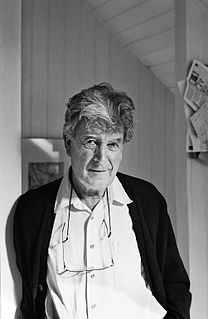
David Ashton is a Scottish actor and writer. Trained at the Central School of Speech and Drama in London, 1964–67, he has acted in a wide variety of film, television, theatre and radio roles. He has also developed a parallel career as a writer of fiction, film and television screenplays and plays for theatre and radio. His radio play The Old Ladies at the Zoo, which starred Peggy Mount and Liz Smith, won the Radio Times Drama Award in 1985.
Troy is a trilogy of radio plays, first broadcast on BBC Radio 3 from 28 November to 30 November 1998. The cast is led by Paul Scofield, who came out of retirement to take part. Troy was written by Andrew Rissik and produced by Jeremy Mortimer. The trilogy is a companion piece to King Priam, Rissik's earlier more optimistic take on the story in which Scofield took the title role.
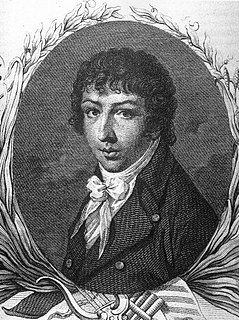
Dido, Queen of Carthage was an opera in three acts by Stephen Storace. Its English libretto by Prince Hoare was adapted from Metastasio's 1724 libretto, Didone abbandonata, which had been set by many composers. Storace's opera premiered on 23 May 1792 at The King's Theatre in London combined with a performance of his masque, Neptune's Prophecy. The story is based on that of Dido and Aeneas in the fourth book of Virgil's Aeneid. The opera was not a success and was never revived after its original run of performances. The score has been lost.

Vicki is a fictional character played by Maureen O'Brien in the long-running British science fiction television series Doctor Who. An orphan from the 25th century, she was a companion of the First Doctor and a regular in the programme in Seasons 2 and 3 in 1965. Her last name was never revealed during the series. Vicki appeared in 9 stories.

Polydorus or Polydoros is the youngest son of Priam in the mythology of the Trojan War. While Homer states his mother is Laothoe, later sources state his mother is Hecuba. Polydorus is an example of the fluid nature of myth, as his role and story vary significantly in different traditions and sources.
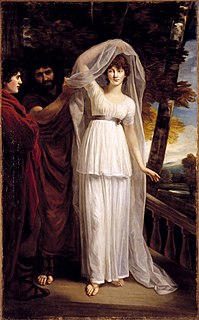
Troilus and Cressida is a play by William Shakespeare, probably written in 1602.
Eneide is a seven-episode 1971–1972 Italian television drama, adapted by Franco Rossi from Virgil's epic poem the Aeneid. It stars Giulio Brogi as Aeneas and Olga Karlatos as Dido, and also stars Alessandro Haber, Andrea Giordana and Marilù Tolo. RAI originally broadcast the hour-long episodes from 19 December 1971 to 30 January 1972. A shorter theatrical version was released in 1974 as Le avventure di Enea.
References
- ↑ "Scottish Theatre Archive – Event Details". Archived from the original on 4 March 2016.
- ↑ "Robert Hanks "Arts & Books: Troy: this time it's personal", The Independent Saturday, 28 November 1998".
- ↑ ""The week in Radio: There's still no place like Homer", The Independent Sunday, 6 December 1998".
- ↑ "Chichester Festival Theatre site, Minerva Theatre 2000".
- ↑ "Novo Vrijeme site, Gina Landor: "There's drama all around me", 13 September 2013".
- ↑ "Robert Gore Langton "There's nothing meek and mild about Christ", The Times April 5, 2004".
- ↑ "Gillian Reynolds "Tune in, and turn back the clock" The Daily Telegraph, 13 Apr 2004".
- ↑ "scriptusbooks.com".
- ↑ "The British Theatre Guide site, Fringe 2007 reviews, The Enchanted Lovers". Archived from the original on 4 March 2016. Retrieved 25 December 2015.
- ↑ "UK Gameshows.com site, Do The Right Thing".
- ↑ "scriptusbooks.com".